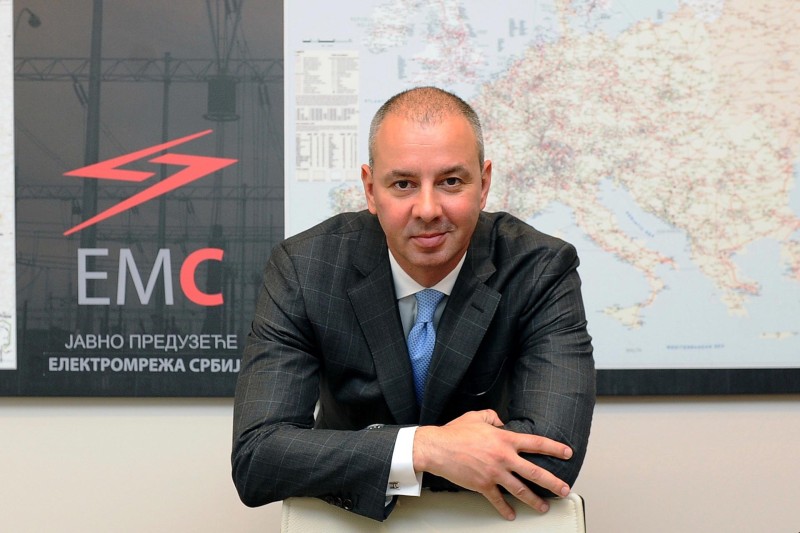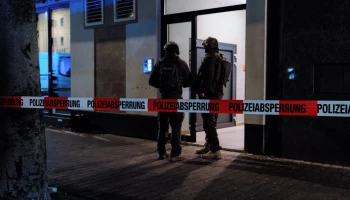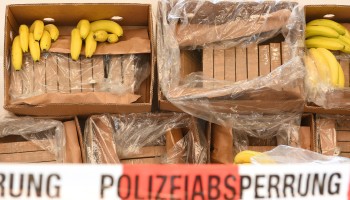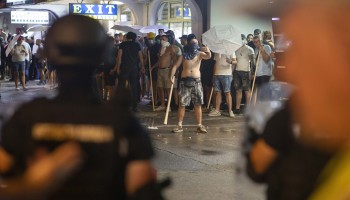As Colombia’s borders closed down during the COVID-19 pandemic, Serbian Dejan Stanimirović became an unexpected houseguest of Jose Vicente Rivera Mendoza, an alleged drug boss.
The visit ended in a night of chaos and bloodshed on March 31, 2020, that killed them both and left lingering suspicions about why Stanimirović had visited Rivera in the first place.
Now, KRIK has uncovered information that raises new questions about Stanimirović’s connections not only to Colombian drug dealers, but to a key member of the Serbian president’s inner circle.
It turns out that Stanimirović was a member of a Balkan drug trafficking gang, according to a European police official who spoke with KRIK.
He was also the co-owner of a telecommunications company along with Nikola Petrović, a powerful Serbian businessman and the so-called “best man” of President Aleksandar Vučić.
Petrović belongs to a small circle of people trusted by the president, making him one of the most powerful people in Serbia. The discovery of the corporate partnership between Petrović and Stanimirović, which lasted from 2004 to 2010, is significant in this context, especially since journalists have previously uncovered other ties between Petrović and figures linked to organized crime.
The Serbian State and Organized Crime
State ties to organized crime have been a serious problem in Serbia for the past three decades, impeding the country’s development and democratization and eroding the public’s trust, said Bojan Elek, deputy director of the Belgrade Center for Security Policy.
Petrović told OCCRP that he and Stanimirović had ended their business relationship in 2007, and he had not seen him since then.
“The gentleman you mention [Stanimirović] was the world champion in karate at the time when we worked together in business,” Petrović said in a written response to questions.
“I really don’t know what happened to him after that, because I haven’t seen him since 2007 (16 years). I did not receive any information about his activities, and I did not even know that, as you say, he had been killed.”
It is not known if Stanimirović was involved in organized crime during the period he and Petrović were in business together, and he left no criminal record in Serbia.
But Stanimirović was known to Europol since at least 2018 as “a person involved in drug trafficking in Portugal, Serbia, Croatia and Germany,” an official from the European police agency told KRIK.
“He belongs to a drug clan of Balkan origin that imports large quantities of drugs into Europe,” said the official on condition of anonymity, as he was not authorized to speak to the media.
The allegation may help explain why Stanimirović was shot in the home of Rivera, the alleged drug dealer and former head of a Colombian paramilitary group who was also known as “Soldado,” or “Soldier.”
The year after his death, Colombian authorities confiscated Rivera’s properties, worth more than 4.4 million euros, saying they had likely been purchased with drug money.
Colombian investigators who spoke with Balkan Insight in 2020 said Stanimirović had visited Colombia before, and suggested that the purpose had been to arrange drug shipments. “He wasn’t here doing ecotourism,” one police officer told the publication.
Internal prosecutorial documents about the incident seen by OCCRP say that after a night of heavy drinking at Rivera’s house in the town of Gaumal, several hours south of Bogotá, a dispute broke out and both men ended up shot.
Stanimirović was found in the street outside the house with a bullet in his face and transferred to a local hospital, where he later died.
Colombian police are investigating Rivera's stepson, Nicolas Roberto Mosquera Ariza, as a suspect in Stanimirović’s murder, but have not yet decided whether to charge him with a crime, prosecutors told OCCRP.
But long before his final ill-fated trip to Colombia, Stanimirović was a partner in a company with Petrović, who is Vučić’s kum, a Serbian term that can be translated as “best man,” but conveys a meaning similar to “blood brother.”
The firm, Bel Mobile, was registered as a telecommunications company. Media reports from the period when it operated described it as an internet provider that would enable people living in rural areas to access the internet through telephone landlines.
Petrović signed a contract in 2004 to buy a majority share in Bel Mobile — which Stanimirović already owned a stake in — and officially registered the change in Serbia’s business registry the following year. They ran Bel Mobile together until it went bankrupt in 2010 and was dissolved, although the company’s bank accounts were frozen in 2007 due to an inability to pay its debts. It left few records of business activity, having filed financial reports in only 2003 and 2004. They showed that Bel Mobile was profitable in 2002, operated at a loss in 2003, and made almost no profit the following year.
Despite this apparent business failure, Petrović would find success starting a couple years later, as his close friend Vučić rose to power.
Petrović was appointed head of the public electricity transmission company Elektromreža Srbije in 2012 when Vučić was a powerful first deputy prime minister.
Petrović left the post at the end of 2016 and became a private businessman, but he continues to benefit from his relationship to the government. His investments in the renewable energy sector receive more than 2 million euros in state subsidies each year.
Petrović has also set up at least two offshore companies. The Pandora Papers –– a leak of information from 14 corporate service providers –– revealed a British Virgin Islands firm with a secret bank account. He founded the company in 2016 when he was still a public official, but he failed to declare it to Serbia’s anti-corruption agency, as required by law.
Luxembourg corporate data, compiled as part of OCCRP’s OpenLux project, showed that Petrović incorporated a company in that country in 2019. He used the firm to buy an aviation company from Stanko Subotić, a controversial Serbian businessman with ties to organized crime. In 2018, the Balkan Insight Reporting Network also published images of Petrović embracing Zvonko Veselinović, an influential Serbian organized crime figure in northern Kosovo. Veselinović was sanctioned by the U.S. government in 2021 for his gang’s “notorious” corruption.
While Petrović grew rich in the private sector after the bankruptcy of Bel Mobile, his former business partner, Stanimirović, had no notable public profile. He resurfaced only when his murder in Colombia was reported in the media.
Stanimirović’s family’s lawyer, Aleksandar Šćekić, declined to comment.
Daniela Castro (OCCRP) and Jhon Moreno contributed reporting.






